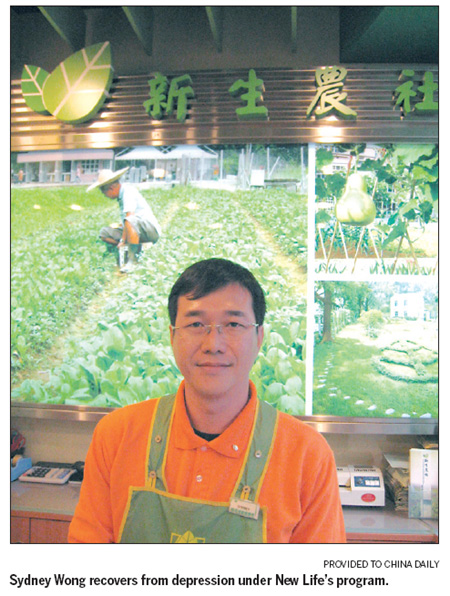Investments that save spent minds
Updated: 2010-06-10 09:23
By Ming Yeung(HK Edition)
|
|||||||||
|
New Life Psychiatric Rehabilitation Association holds a talk show to promote their mental health message. Provided to China Daily |

When the best intentions of family and friends fail to 'save' the mentally disturbed, what are the best steps
to take? Ming Yeung reports.
Hong Kong people have been lately bombarded by news reports of "psychos" throwing objects from heights, attacking or even slaying people, distorting their perceptions of the mentally ill.
"People tend to link brutalities with mentally disordered people. But based on our analysis, only 5 percent of criminals actually have psychiatric-problem records," said Sania Yau, CEO of New Life Psychiatric Rehabilitation Association, an NGO providing rehabilitation services for recovered mental patients and the mentally handicapped. It was founded in 1959 and is currently serving around 6,600 patients annually.
While the concept of rehabilitation is most commonly associated with addictions, physiotherapy and criminal justice, in the context of mental health it seems to straddle what could be called the "Big 4 Cs": cure, control, confidence and connection - the latter being facilitating opportunities for the psychiatrically challenged to connect with a job, find a stable home, and to establish a support network of friends and professionals.
Like everyone, the mentally ill cannot be exempted from life's trials, but they have to additionally bear the burden of "being labeled", Mak Ki Yan, Honorary Professor of the Department of Psychiatry at the University of Hong Kong, noted. Such labeling will clearly impact their opportunities, willingness and capacity to "connect", and may adversely affect confidence and control, in the event being stigmatized provokes or exacerbates a troubling and troubled response.

The population of the mentally ill in the city is sizeable. According to official statistics, at present, over 150,000 people with mental health problems are receiving treatment and support through the hospitals, psychiatric specialist outpatient clinics and community services of the Hospital Authority. However, the figures are significantly underestimated. "The reason for that is some people do not realize they are mentally ill or even they did, they did not want to receive assistance," said Mak.
Recently, public discussion is mostly directed at how to minimize the potential threats posed by the mentally ill living in our communities, with little said about providing ways for them to return to productive lives.
Sydney Wong Chi Fai, a shop supervisor of New Life Healthy Living Specialty/Organic Shop, survived the ordeal from struggling with depression under New Life's program.
Having business setbacks and being forced to file bankruptcy in 2002, Wong's emotions hit bottom and he found that he couldn't live without his wine bottles. He had worked casual jobs in his friends' companies but none of them lasted long because of his dependency on alcohol. "At that time, I suffered insomnia and cried privately," he recalled.
Used to be the one who brought home the bacon, Wong felt that sickness imposed a great burden on his wife and kids. "I was unable to pay gas and electrical fees for three months and we spent several days in the dark," he sighed, adding that his brother even wanted to keep his distance from him. When his alcohol abuse effectively cut him off from his friends, family and society after two years, he finally decided to get clean and checked into a hospital in 2004.
Treatment - not "cure" - started by battling his alcohol dependence, together with anti-depression medication, with a clear focus on "control" as his most pressing challenge. During his 3-year therapy, his occupational therapist constantly persuaded him to rejoin the work force to regain his self-esteem - a step that offered great promise in the dimensions of "connection" and "confidence". After several refusals, he gave a training course organized by New Life a go - an experience that he describes as unforgettable.
"I felt indifferent at first. I was assigned to sweep and mop the floor the first two days, I felt bad after work and wanted to give up so badly," Wong said. "What kept me going was the endurance and kindness shown by my colleagues. The joyous atmosphere aroused my curiosity and motivated me to persist."
To sooth the immense stress of Hongkongers like Wong, in 2003 New Life established "Family Network", a self-help group of mentally ill family members, which facilitates connection and confidence through communication, and derivatively, (self-) control, to the extent it can help allay feelings of panic, anxiety, helplessness, guilt, alienation, purposelessness and valuelessness that commonly afflict the afflicted.
Yiu Lai Fong, vice-chairperson of Family Network, whose younger brother suffered from bipolar disorder, has walked the thorny journey for more than 20 years. Yiu's brother was traumatized by the death of their father in the 80s and started to hallucinate afterwards.
"He is unpredictable. We were worried when his mental state deteriorated," Yiu said. Lacking expertise and assistance, Yiu reacted wrongly to help her brother. "We encouraged him to be proactive but it turned out to be an enormous pressure on him and ultimately, created conflicts," an outcome that demonstrates the sad fact that good intentions of non-professionals may backfire.
On and off, Yiu's brother needed to be hospitalized when the pressure was too overwhelming for him. When his mental state became stable, he stayed at the halfway house offered by New Life. "My brother had made strides during his stay at the halfway house. He learned to be self-reliant and content by earning his own living," Yiu recalled with a smile, reflecting the progress his brother made in the fourth dimension of "rehabilitation" - confidence.
Mak suggested the ex-mentally ill live together in transitional accommodation. "This arrangement not only serves the purpose of mutual support, but also gives them opportunity to become accustomed to human contacts," he said, alluding to the "connection" factor.
Although there are many pathways to recovery, among the several factors that stand out, Mak suggests a home, a job, friends and integration in the community are among the most crucial.
"The better the social network, the faster they will get well," Mak told China Daily.
With the care and support of medical professionals, social workers and family members, Yiu's brother recovered eventually. "Without support from family members, the mentally ill can hardly recover," she said.
Although NGOs and government agencies share a common concern about the health of the mentally ill, the government has been under fire in some quarters for not providing enough aftercare service for the mentally disturbed.But, there is rarely enough money for rehabilitation programs that help people manage their lives, Yiu admitted.
To fill these gaps and to address the myths, fears and stereotypes of the mentally ill, New Life provides community support in two levels - public education and outreach services. Public education aims at minimizing the public's misunderstanding and the stigma against the mentally ill. The association educates the public through leaflets, talks and media interviews. Dramatic performances have also been launched to promote the mental health message, while outreach services target those hidden or suspected cases.
To the "Big 4 Cs", Mak appeared to ask us all to add one more: compassion. "No one is immune to the potential of having mental problems; therefore, no one has the right to discriminate against these people," Mak said.
"Many mentally ill people have the capacity to lead productive lives upon recovery. We should provide that opportunity for them. Just as Sydney put it, 'At this age, I want nothing but a stable job and to live happily every day.'"
(HK Edition 06/10/2010 page2)
